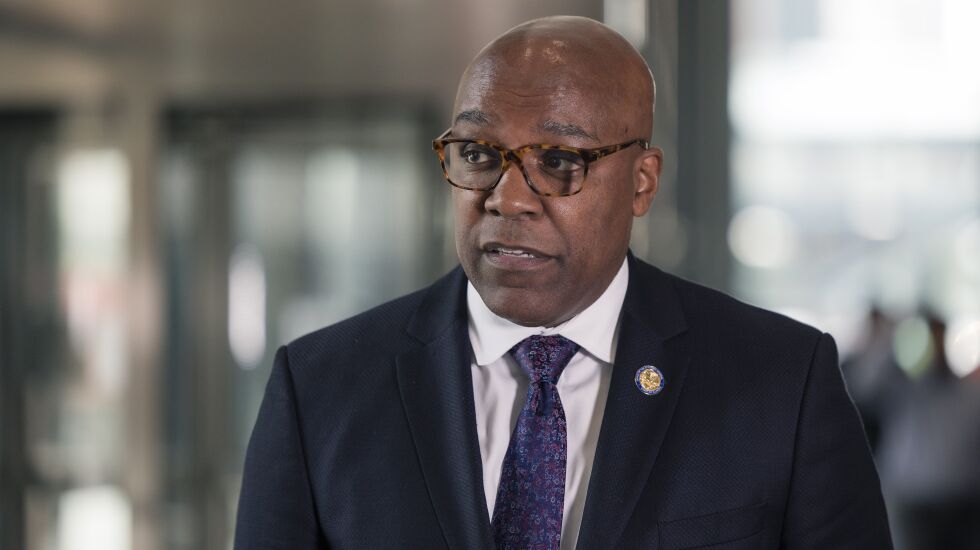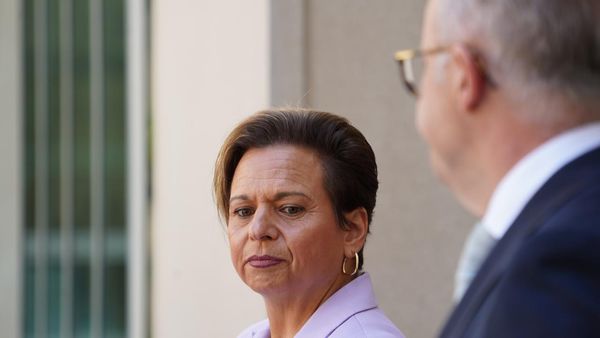
The Illinois Supreme Court’s decision on Tuesday to uphold the elimination of cash bail marked a sweeping win for Gov. J.B. Pritzker and many progressive Democrats who argued that change was needed in a system where violent offenders could buy their way out of jail, while the poor await trial behind bars.
The decision comes eight months after Pritzker resoundingly defeated Republican Darren Bailey in the gubernatorial election, as the former state senator and downstate farmer railed against the Democratic governor’s criminal justice policies.
The Democratic governor has also been able to sign into legislation several progressive measures, including an assault weapons ban passed by Democratic supermajorities in both the Illinois House and Senate that faces its own court challenge.
Five of the seven Illinois Supreme Court justices — whose decision promises to end cash bail Sept. 18 — were elected as Democrats. Pritzker dipped into a trust fund last year to help boost two of those Democrats who ultimately won.
SAFE-T Act sponsors argued that the elimination of cash bail would put judges’ focus on a criminal defendant’s risk assessment, as opposed to whether they have access to cash in determining if they should be held in jail while awaiting trial.
Many Republicans argued — and still do — that cash bail would put violent offenders back on the street, putting victims at risk.
A short statement from Pritzker — who has been in the United Kingdom on a trade mission since last week — belied the months of pummeling he and other Democrats weathered on the campaign trail last year from Republicans who tried, and mostly failed, to rally votes around on the issue.
“We can now move forward with historic reform to ensure pre-trial detainment is determined by the danger an individual poses to the community instead of by their ability to pay their way out of jail,” Pritzker said.
Cook County State’s Attorney Kim Foxx called out “other state’s attorneys and sheriffs and others in law enforcement who sought to stand in the way of the implementation of this law.”
“The fact of the matter is out of 102 state’s attorneys, there were only two who said that this was the right thing to do,” Foxx said during an online news conference, referring to herself and Lake County State’s Attorney Eric Rinehart.
Foxx, who announced this year that she won’t seek a third term in the 2024 election, added: “Today’s ruling by the Illinois Supreme Court affirms what those who have been on the front lines of this movement for the last 10 years have been saying all along: that our system that previously was based on wealth, and not on public safety, could no longer stand.”
On the other side, Will County State’s Attorney James Glasgow — a Democrat who led 64 county prosecutors in the legal fight against the reform — said in a statement that “[o]ur mission was never to stop principled bail reform, but to ensure our criminal justice system continues to protect the safety of the law-abiding citizens of Illinois from ruthless, violent criminals... I pray to God that prosecutors and law enforcement will continue to be able to properly address violent crime and maintain the safety of our communities given the serious limitations placed on all our agencies by the Act.”
State Sen. Robert Peters, a Chicago Democrat who championed the legislation, called the reform “an historic civil rights victory that has become our state’s version of Obamacare” — while slamming the “repeatedly disgusting fight by right-wingers who don’t care about people’s safety and play dirty politics with people’s lives.”
“The only ‘purge’ that happened was a waste of taxpayer dollars and time,” Peters said.
State Sen. Elgie Sims Jr., D-Chicago, another chief sponsor of the controversial legislation, said, “Today’s decision will allow us to continue the long overdue step toward dismantling systemic racism.
“Illinois continues to show the rest of the nation that monumental change is possible to make our criminal legal system fair, equitable and just for all.”
Key Republicans in the state denounced the decision, including Bailey, who is running against incumbent U.S. Rep. Mike Bost in the 12th District. Bailey blasted Pritzker for having contributed to the two state Supreme Court races, and he vowed to correct the “detrimental law” if elected.
“Once again, pay-to-play politics has triumphed over the safety and security of the people of Illinois,” Bailey said in a statement. “The ruling on the SAFE-T Act is a glaring example of how politics can overshadow the true needs and safety of our communities.”
Illinois Senate Republican Leader John Curran, R-Downers Grove, said it warranted a special session to address key concerns within the SAFE-T Act before no-cash bail goes into effect.
“While no person should be held in jail or let free because of their economic circumstances, the SAFE-T Act handcuffs law enforcement and judges, making it more difficult for them to combat violent crime,” Curran said in a statement. “It is possible to reform our cash bail system while keeping our communities safe, and the legislature should return immediately to ensure that public safety is in no way jeopardized by the implementation of this reckless legislation before it takes effect.”
Illinois House Republican Leader Tony McCombie, R-Savanna, said the decision by the “liberal” court is about “elevating criminals.”
“Politically compelled public policy has never been in the best interest of the people. The liberal court’s decision today is not surprising, and this decision will undoubtedly hurt families and businesses around the state,” McCombie said in a statement. “Anyone that is familiar with the court system knows that this is not about the ability whether an offender can post bail, but a progressive movement to decriminalize crime and promote an environment for repeat offenders.”
Bail reform also became fodder in the Chicago mayoral election, as now-Mayor Brandon Johnson supported its elimination of cash bail and opponent Paul Vallas argued against it.
“Cash bail does not make communities safer, and it never has; it has simply exacerbated existing inequities and disparities in the criminal legal system,” Johnson said in a statement. “I am grateful that we can move forward to implement this legislation to uphold justice and equity.”
He joined other top Illinois Democrats in roundly hailing the decision, including Cook County Board President Toni Preckwinkle, who celebrated “a historic victory for justice across Illinois.”
“The use of money bond has perpetuated systemic racial injustice and exacerbated the inequities faced by communities of color,” she said. “Together, we’ve engaged in an unprecedented collaborative process to prepare for this transformative moment.”
Illinois Attorney General Kwame Raoul, the Democrat whose office argued the case in favor of the SAFE-T Act before the Supreme Court, said he was “pleased — although not surprised,” that it was ruled constitutional.
“Attorneys from my office have spent many months defending the SAFE-T Act’s constitutionality in courtrooms throughout Illinois against meritless challenges,” Raoul said in a statement. “I am proud of their dedication and appreciate their service to the people of Illinois.”

Illinois House Speaker Emanuel “Chris” Welch, D-Hillside, said the state’s high court “upheld the Legislature’s promise to create a more equitable and fair criminal justice system — a system that can now better protect victims and will no longer allow violent offenders to buy their way out of jail.”
“Today’s decision is a win for the people of this state, but also for our democracy,” Welch said. “Our state’s highest court rightfully ruled that frivolous lawsuits cannot and will not stop the legislative process.”
State Senate President Don Harmon said the decision “culminates a long and challenging journey toward fundamental fairness in our legal system that would ensure the accused stay behind bars because they are dangerous, not because they lack dollars in their pockets.
“The unjust foundations of our society were not built quickly, and they will not be dismantled with ease,” the Oak Park Democrat said in a statement. “But we have taken a great step forward today, and I look forward to the road ahead.”
U.S. Rep. Delia Ramirez, who sponsored the legislation in the statehouse before being elected to represent Illinois’ 3rd Congressional District, said the law helps close “loopholes to the wealthy.”
“Today’s Supreme Court decision makes Illinois the first in the nation to end this inequitable practice, and provides a model for other states wanting to end the criminalization of poverty,” she said in a statement. “Now, decisions about detaining defendants will be made based on direct threats to community safety, and not how much wealth someone has.”
West Side Congressman Danny Davis said the decision “marks a pivotal moment in our ongoing efforts to reform our criminal justice system and ensure that it truly serves the best interests of our communities.
“By removing the financial barriers that have long hindered equal access to justice, we can now work toward a system that is built on rehabilitation, restoration, and compassion,” Davis said.
Illinois Democratic Party Chair Lisa Hernandez called the ruling “a victory in the fight for a fairer criminal justice system.”
“For too long, our pretrial detention system has prioritized wealth over public safety, and ending cash bail in Illinois is crucial to ending unjust criminalization of poverty. I’m grateful to the governor and attorney general for their unwavering commitment to building a more equitable Illinois for all,” Hernandez said in a statement.
Lt. Gov. Juliana Stratton said the decision was “a major step in the right direction on our journey to justice.”
“All along, our goal has been to right the wrongs of policies that have disproportionately harmed Black, Brown and low-income Illinoisans while, at the same time, bolstering public safety by building a system that centers on accountability and fairness,” Stratton said in a statement. “We have made great strides, and we are forging ahead.”







